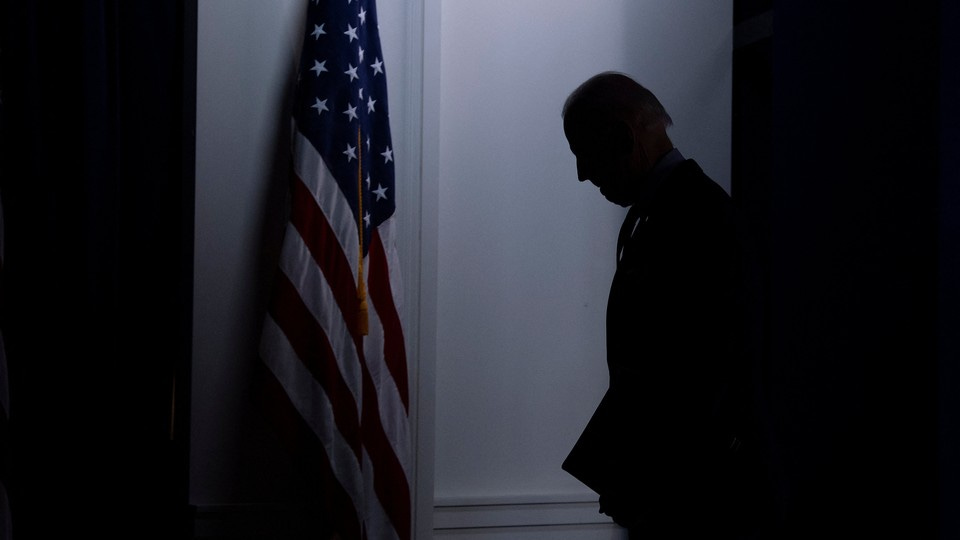Franklin Foer in the Atlantic has a good piece on President Biden’s handling of Ukraine.
I agree with his analysis: the President is doing a good job.
I imagine he’s getting pressure from the no-fly-zone hawks, neocons, and the other “usual suspects” but he’s trusting his own instincts and so far I feel much better knowing he’s there (much different than I felt about his mishandling of his Afghanistan debacle.
My only disagreement: Foer thinks that Biden has sufficiently depoliticized the Ukraine issue and thus “as gas prices spike, it will be rhetorically harder for Republicans to effectively pin the blame on him, because they have been fully supportive of sanctions.”
Wrong, wrong, wrong. Nothing will stop the traitorous GOP from blaming Biden and the Democrats for…anything and everything. That is who they are: they wish the worst for this country in order to get themselves back in office to do more harm. Speaking of harm, here is the most chilling thing I read today about what we can expect if these insurrectionists take Congress in November.
Excerpts follow:
Read The Atlantic’s continuing coverage of Russia’s war on Ukraine here.
Biden Answered the 3 a.m. Call
It’s hard to imagine that any of his rivals from the last election could have matched the president’s performance in this crisis.
MARCH 8, 2022, 10:43 AM ETSHARE
About the author: Franklin Foer is a staff writer at The Atlantic. He is the author of World Without Mind and How Soccer Explains the World: An Unlikely Theory of Globalization.
When Hillary Clinton sought to sow doubts about Barack Obama, her rival for the 2008 Democratic presidential nomination, she ran an attack ad tarnishing him as dangerously inexperienced. As the screen shows images from a suburban house, a husky-voiced narrator intones: “It’s 3 a.m. and your children are safe and asleep, but there’s a phone in the White House and it’s ringing.” There’s clearly been a terrible international incident. The narrator asks, “Who do you want answering the phone?”
As the Russian invasion of Ukraine has unfolded, the narrator’s question has rattled around my head. The invasion is a moral test, because Putin has committed atrocities that demand the strongest possible response. And it is a strategic test, because the strongest possible response could very plausibly escalate into a nuclear conflict.
Joe Biden hasn’t received the full credit he deserves for his statecraft during this crisis, because he has pursued a policy of self-effacement. Rather than touting his accomplishments in mobilizing a unified global response to the invasion, he has portrayed the stringent sanctions as the triumph of an alliance. By carefully limiting his own public role—and letting France’s Emmanuel Macron and Germany’s Olaf Scholz take turns as the lead faces of NATO—he has left Vladimir Putin with little opportunity to portray the conflict as a standoff with the United States, a narrative that the Russian leader would clearly prefer. He’s shown how to wield American leadership in the face of deep European ambivalence about its exercise.
His handling of the domestic politics of the crisis has been just as savvy. Although he could justifiably have portrayed Republicans as the party of Putin apologists, he refrained from dinging his political enemies. During his State of the Union address, he actively encouraged Republicans to feel as if they were his partners in a popular front.
This is surely redolent of the bipartisan foreign policy that Biden nostalgically yearns to revive. But it’s also an important tactic. By depoliticizing the issue, he has made it likely that Congress will quickly fund aid and arms for the Ukrainian military. And as gas prices spike, it will be rhetorically harder for Republicans to effectively pin the blame on him, because they have been fully supportive of sanctions.
Even as Biden has built a bipartisan consensus, he’s resisted pressure to pursue a more hawkish course. As a Democrat who lived through the 9/11 era, he remembers well how he and other leaders of his party adopted chest-thumping policies to defuse accusations of weakness. For decades, Democratic aspirants attempted to demonstrate their own steel in order to avoid evoking the politically fatal image of Michael Dukakis in a tank.
The same dynamic could have easily transpired with Ukraine. But Biden’s faith in his own foreign-policy chops leaves him unconcerned about proving his bona fides. He knows the dangers of bluster and has steadfastly avoided them. When Putin announced that he was putting his nuclear arsenal into “special combat readiness,” Biden quickly made clear that he wouldn’t reciprocate. He has brushed off calls to impose a no-fly zone over Ukraine. From the start of his administration, he has tried to telegraph his thinking to Putin, so that the Russian leader could never misunderstand his intentions, and would never mistakenly assume that an American strike against Russia was imminent….
It’s a quietly bravura performance—and it’s hard to imagine that any of Biden’s rivals from the last election, not just Donald Trump but also the Democrats, could have come close to matching it. If anything, it is reminiscent of how George H. W. Bush led the world through the end of the Cold War, a similarly chaotic moment that could have easily exploded into nuclear conflict. In the middle of Joe Biden’s 3 a.m. call, I find myself grateful that he’s the one answering the phone.




